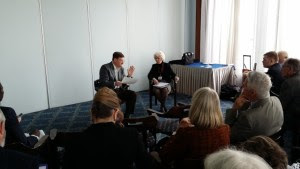Advertisement
I attended a meeting in Moscow on Friday with Vladimir Kozin, longtime member of Russia’s foreign service, advisor to the government, author, and advocate for arms reduction. He handed out the list of 16 unresolved problems above. While he noted that the United States funds NGOs in Russia, as well as Ukraine, to influence elections, and described that as a reality in contrast to U.S. stories of Russia trying to influence a U.S. election, which he called a fairy tale, the topic did not make the top-16 list.
He added to the top of the list as something that could be obtainable, and something he considers very important, the need for an agreement between the U.S. and Russia on no first use of nuclear weapons, an agreement that he thinks other nations would subsequently join.
Then h e stressed what he’s listed as the first item above: removing what the U.S. calls missile “defense” but what Russia views as offensive weaponry from Romania, and ceasing the construction of the same in Poland. These weapons combined with no commitment to no first use, Kozin said opens up the possibility of an accident or a misinterpretation of a flock of geese leading to the destruction of all human civilization.
e stressed what he’s listed as the first item above: removing what the U.S. calls missile “defense” but what Russia views as offensive weaponry from Romania, and ceasing the construction of the same in Poland. These weapons combined with no commitment to no first use, Kozin said opens up the possibility of an accident or a misinterpretation of a flock of geese leading to the destruction of all human civilization.
Kozin said that NATO is encircling Russia, creating wars outside of the United Nations, and planning for first use. Pentagon documents, Kozin accurately stated, list Russia as a top enemy, an “aggressor” and an “annexer.” The U.S. would like, he said, to break Russia apart into small republics. “It will not happen,” Kozin assured us.
Sanctions, Kozin said, are actually benefitting Russia by moving it from importation to domestic production of goods. The problem, he said, is not sanctions but the total lack of action on arms reduction. I asked him if Russia would propose a treaty to ban weaponized drones, and he said that he favored one and that it should not cover only fully automated drones, but he stopped short of saying that Russia should propose it.
Kozin supported the proliferation of nuclear power, without explaining away the problems of accidents like Fukushima, the creation of targets for terrorism, and the moving of any nation that acquires nuclear power closer to nuclear weaponry. In fact, he later warned that Saudi Arabia is acting with just that intention. (But why worry, the Saudis seem very reasonable!) He also noted that Poland has asked for U.S. nukes, while Donald Trump has talked of spreading nuclear weapons to Japan and South Korea.
Kozin would like to see a world free of nuclear weapons by 2045, a century since the defeat of the Nazis. He believes that only the U.S. and Russia can lead the way (though I believe the non-nuclear nations are right now doing so). Kozin would like to see a U.S.-Russia summit on nothing but arms control. He recalls that the U.S. and Soviet Union signed six arms control agreements.
Kozin defends weapons sales as long as they are legal, without explaining how they are not destructive.
He also defends holding out optimism that Trump might meet some of his pre-election promises regarding better relations with Russia, including a commitment to no first use, even while noting that Trump has gone back on most such promises since the election. Kozin noted that what he called the Democratic Party’s promotion of fairytales has been very damaging.
Kozin spent some time on the usual fact-based response to the as-yet-unproven U.S. accusations of election interference, as well as providing the usual reality-focused response to accusations of invading Crimea. He called Crimea Russian land since 1783 and Khruschev’s giving it away as illegal. He asked the leader of a delegation of Americans that visited Crimea if she had found a single person who wanted to rejoin Ukraine. “No,” was the response.
While Russia had the right to keep 25,00 troops in Crimea, he said, in March 2014 it had 16,000 there, even as Ukraine had 18,000. But there was no violence, no shooting, just an election in which (perhaps disturbingly to Americans, I guess) the winner of the popular vote was actually declared the winner.

